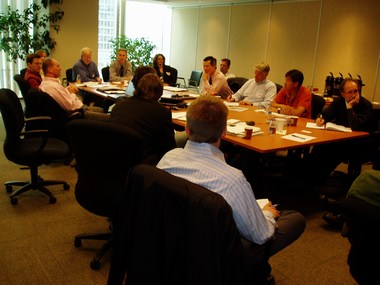2005 Annual Report from the Chair of the BCWWA Water Sustainability Committee
Note to Reader:
In 2003, the Water Sustainability Committee, a technical committee of the British Columbia Water & Waste Association (BCWWA), embarked on a partnership with the Province and others to develop and implement the Water Sustainability Action Plan for British Columbia.

Context & Overview
The mission of the Water Sustainability Committee (WSC) is to “facilitate the move toward a more sustainable approach to water resource management –at all levels from the province to the household.” The vision that the Committee continues to hold before it is:
Stewardship of a limited and vital resource, actively supported by an aware and educated citizenry.
 “In 2004, work of the WSC continued at breakneck speed. In the second year of a multi-year implementation of the Water Sustainability Action Plan for British Columbia, significant progress was made on each of the six key elements,” reports Raymond Fung, WSC Chair.
“In 2004, work of the WSC continued at breakneck speed. In the second year of a multi-year implementation of the Water Sustainability Action Plan for British Columbia, significant progress was made on each of the six key elements,” reports Raymond Fung, WSC Chair.
“The Action Plan is comprehensive in scope and provides an umbrella for grassroots initiatives, ranging from governance to site design that are informing Provincial policy through shared responsibility.”
Move from Talk to Action
Over the last year, explains Raymond Fung, the WSC has found it useful to frame water sustainability issues through three defining questions:
- What is the issue or problem?
- So what? Or in other words, what is its significance?
- Now what? Or in other words, what can be done to address this situation?
“The WSC believes it is simply not good enough to focus only on defining the problems (the ‘what’) or debating the perspectives (the ‘so what’). Hence, the objective of the Action Plan is to challenge individuals and organizations to demonstrate how we can move from talk to action (the ‘now what’).”
Status of Action Plan Elements
In his 2005 Annual Report, Raymond Fung described the status of Action Plan elements as follows.
- WaterBucket Website Partnership – Over $100,000 has been raised to develop www.waterbucket.ca, which will be formally launched at the BCWWA 2005 AGM in Penticton Annual Conference. Creating virtual Communities of Interest, including green infrastructure, watershed-based community planning, agricultural irrigation, water policy/governance, and rainwater management are envisioned. It is hoped that the motto, “When the topic is “water,” just go to waterbucket.ca” will over time become part of everyday language in BC.
- Water$ave Took Kit for British Columbia– Initially developed by the Ministry of Water, Land and Air Protection in 2004 in another format, the toolkit is now the first drop in the WaterBucket! Some 50 province-wide success stories have been posted under the Water Use and Conservation Community-of-Interest.
- Convening for Action – Roundtable on Water Sustainability– $75,000 has been raised for the WSC to complete initial tasks towards organizing a transformational event in mid-2006 that will be the catalyst for water policy/governance reform in BC.
- Green Infrastructure Partnership– together with West Coast Environmental Law and the Master Municipal Construction Documents association, the WSC is developing a Model Subdivision Bylaw and Green Infrastructure Standards for land development regulation. Significant achievements in 2004 included a Stakeholder Consultation to define “green infrastructure” and to clarify expectations regarding deliverables.
- Water Balance Model for British Columbia – quantifying watershed benefits resulting from implementing stormwater source controls down to the site level, this web-based evaluation tool (www.waterbalance.ca) is expanding its reach beyond being a BC application as a result of the Canada Mortgage & Housing Corporation funding the development of a national portal.
- Watershed/Landscape-Based Approach to Community Planning –participation of the WSC in a National Working Group has resulted in this approach being referenced in an InfraGuide Best Practice document for integration of land use and infrastructure planning.
“I wish to thank all the WSC members for their investments of time and effort towards the Committee’s work. Their commitment to addressing water sustainability issues in BC has truly been inspiring and energizing to me. I wish to also acknowledge the support of the Ministry of Water, Land and Air Protection, without which the WSC Program Coordinator position would not have been possible,” concluded Raymond Fung.

